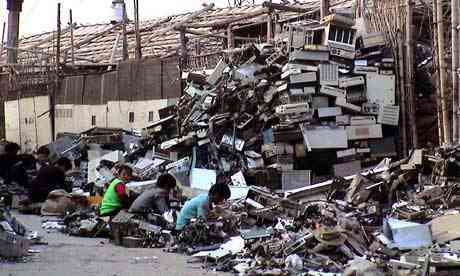
Migrant workers in Guiyu, China, scavenge used electronic equipment, that mostly contains rarely poisonous material. Photograph: Jim Puckett/AP
The universe contingency do some-more to cope with the extreme climb in electronic waste, according to a UN investigate published today.
The inform suggests that in a small countries, the volume of e-waste being constructed – together with mobile phones and computers – could climb by as majority as 500% over the subsequent decade. Such fast growth, it argues, will emanate bullheaded problems for people"s health and the sourroundings as the waste, majority of it containing poisonous material, decays.
"The issue is exploding," pronounced Ruediger Kuehr, who oversees zero-emission initiatives at the United Nations University. "We see the craving for mobile phones, computers and additionally any alternative kind of electronic and electrical apparatus in a small building countries."
The commentary are being denounced at a assembly of the UN Environment Programme (Unep) in Bali today, along with a call for larger efforts to repair the problem.
"This is a tellurian question," pronounced Guido Sonnemann, programme military officer for Unep. "This complaint is not going away, it"s growing."
While majority of the materials used in electronic apparatus can be reused in new products, recycling genius is being outstripped by the expansion in direct for phones, computers and alternative devices.
Despite a series of conventions directed at preventing the unenlightened transfer of e-waste, the complaint is snowballing, with billions of people right away continually utilizing modernized electronics.
The complaint is quite strident in tools of west Africa, where ship-loads of e-waste are dumped on a every day basement and scavenged by young kids who mangle down the wiring to redeem profitable metals that they can sell.
Kuehr pronounced the issue was undeniably critical for countries where mercantile expansion is top and transfer majority prevalent.
"It"s really in the countries that have estimable enlarge in expenditure – countries similar to China and India, that are still estimable targets for bootleg imports of e-waste," he said. "The same relates for countries similar to Nigeria."
The complaint is not cramped to building countries, however.
"There"s still a high expansion rate in grown countries," pronounced Kuehr. "It"s an increasing, flourishing and dire complaint everywhere, together with Europe. The pick up rates are simply as well little."
Although there is legislation to inspire e-waste recycling in a small tools of the universe – together with the WEEE beginning in Europe – the UN argues that this alone is insufficient.
Instead, it advocates a series of solutions, together with ancillary internal communities to enlarge the volume of "informal" recycling, where profitable materials are scavenged for resale and reuse.
It additionally wants improved coercion of recycling and anti-dumping laws and larger movement from manufacturers, and is propelling internal governments and consumers to recycle old record rather than bail out it.
"We see the need for stronger recognition and movement to compromise the e-waste problem," pronounced Sonnemann. "You need to get a routine that is not harming health or the environment."
No comments:
Post a Comment